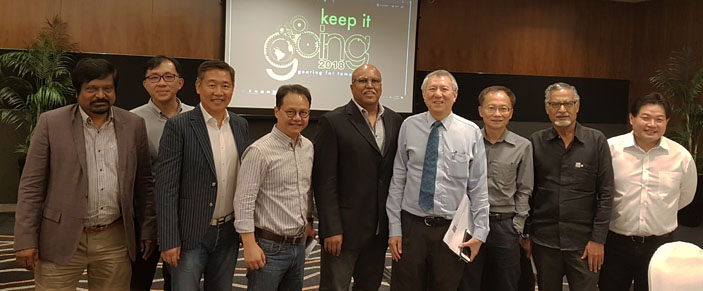BEYOND THE meagre $100-$300 bonus payout that has been roundly ridiculed and the impending goods and services tax (GST) hike, there are many other talking points in Singapore Budget 2018.
Delivered in two parts by Finance Minister Heng Swee Keat on February 19, the talking points were built around what was announced, and what was not raised.
In the first of its Keep It Going sessions this year, STORM.SG gathered a disparate group of panelists at Suntec Convention Centre, to discuss the issues around Singapore Budget 2018. It ranged from infrastructure spending to sports, taxes and the future generation, education and the marketing of Singapore, among others.
The panelists at the session:
P.N. Balji, Media Commentator
K.C. Lau, Managing Partner, K.C. Lau & Co.
Richard Hoon, CEO, I Search Worldwide
Dr Clive Choo, Senior Lecturer in Strategy, Nanyang Business School
Ku Swee Yong, Co-Founder HugProperty
Tan ChinKar, Founder, Write Editions
P. Jeyaratnam, Executive Chairman, S&J Asia-Pacific Ventures
Sam Quek, Co-Founder ES Power
It was moderated by STORM.SG Publisher, Kannan Chandran.

Type Of Budget
From “catch up” to “not painful”, “not innovative” to “conservative” this year’s budget was described in many ways, showcasing a variety of readings into it.
Balji, who draws upon years of experience in the media industry, calls this a “catch up” budget.
He wonders if the expenditure on infrastructure could have been better spread out, if not for the fact that the MRT issues required a lot of fixing and the hospital crunch was not anticipated.
Lau, an accountant, was pleased to note that the SMEs are “the biggest winner” in this Singapore Budget 2018, though he felt the stamp duty hike by 1% for residential property over $1 million is not good as the cost of ownership was already so high.
Property agent Ku countered that most of the 80% living in public housing will not be affected by the $1 million price point. But he did bemoan the fact that with so many layers of taxes, real estate tax is becoming murky at a time when our neighbours are making it more streamlined.
How Will It Be Implemented?
Strategy lecturer, Dr Choo’s concern was more about the implementation of the policies. “They talk about the capacity transfer programme — transferring foreign talent capabilities to locals. I hear from my friends in the finance and IT industries that all the senior positions are taken by foreigners, and a lot of them recruit their own people. That means our local talent in the middle will have a hard time going up.
“The programme sounds good, but how will it be implemented?” Dr. Choo wonders.
You Might Also Like To Read:
Strengthening Links In Asia’s Supply Chains
A Different Sort Of Fishing Tale
Book publisher Tan echoed some of Dr Choo’s concerns. He felt the budget was “not bold enough” to address social issues. While it addresses the aging population, he feels not enough is being communicated about initiatives for the young. “We are not developing children with creative minds,” he said.
Hoon, whose business is in executive search, reckons the government spends months on figuring out how to increase tax “instead of how to manage our costs”.
“Our government is expensive. We are going to be saddled with a mindset that cost is assumed. I expected more from the Finance Minister,” Hoon added.
Entrepreneur Jeyaratnam noted that it’s difficult to get a glamorous budget since this is not an election year. But he too felt that implementation would be key. He observed that SMEs are stuck with survival issues, and feels more graduates should consider working with SMEs, a process he says he has seen work out well.
Decentralised Decisions
Jeyaratnam observed that Finland and Singapore are well-regarded in the area of education, but while Singapore has a top-down policy-making process, Finland’s is decentralised, allowing the schools to develop their own working systems. “There is a far higher incidence of unicorns (startups that are valued over $1 billion) in Finland than even Silicon Valley or here.”
Quek, who is in the retail energy space, was pleased that the carbon tax is being implemented. “I see that as a positive. It is hitting the industry where it’s hurting the environment.”
Hoon has three young adult daughters and said none of his children were impressed with the budget. “It doesn’t impact them in any way. And this is the engine of growth for tomorrow. Why are we not doing anything for this group?
“We have to stimulate the desires of the 20- and 30-somethings to put their careers at risk and try something different,” he added.
Dr Choo felt the budget could have looked at how to market Singapore better. He cited the example of how Korea has taken generally commonplace goods and services and marketed them effectively in other parts of the world.
Some of the panelists also raised the issue of lack of discussion about income inequality.
Tan felt we have a “poverty mindset” and that we should be spending for the future. “With $1 trillion in reserves, why are we not investing for the next 50 years. We should reduce debt for young people and make retirement more comfortable.”
More comments about the Singapore Budget 2018 can be seen in the video. Do share your views on the Singapore Budget 2018 in the comments section.
Keep It Going is supported by OUE Limited. Venue sponsored by Suntec Singapore Convention & Exhibition Centre.























Dr Choo of NBS has correctly identified the problem of MNCs hiring foreign high position workers in place of local equivalent talents. What the foreign MNC CEOs and Chief HROs are doing is a disservice to Singaporeans . These foreign MNCs are given generous tax breaks and funding by the government eg. Skills future and favourable MOM support systems. These are all from tax payers’ pockets. Yet the foreign MNCs are not responding and reciprocating fairly as evident by their hiring practices.